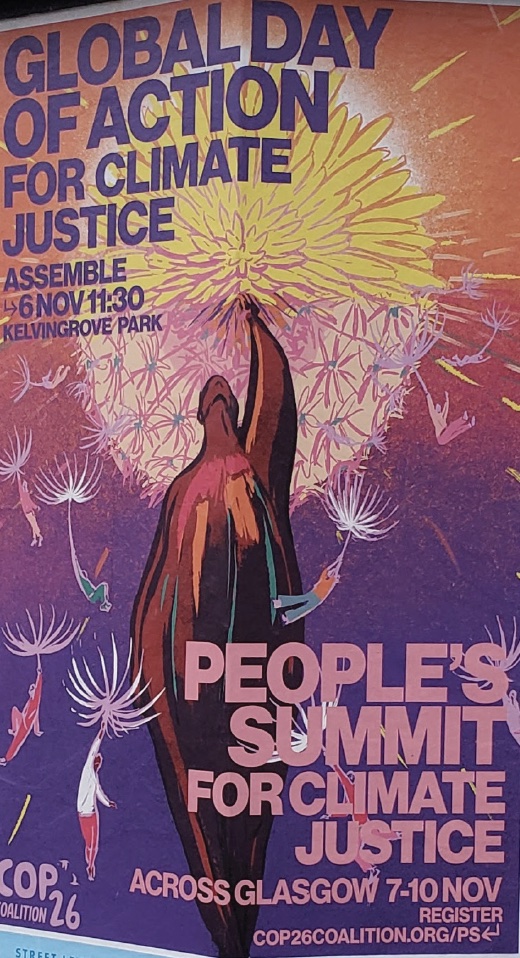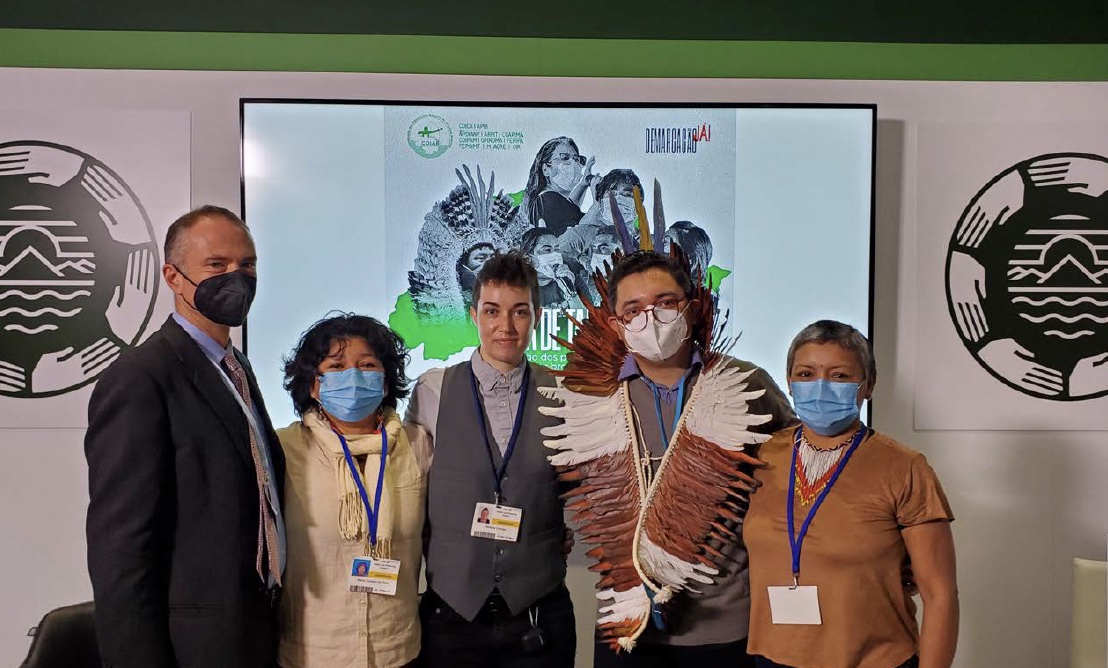COVID-19, Climate Change, And Indigenous Women’s Rights
UN Human Rights Council 48th Session: Key Outcomes

The United Nations Human Rights Council is a United Nations (UN) body whose mission is to protect and promote human rights worldwide. During its 48th Session held September 13-October 11, 2021, the Council focused on two global issues adversely impacting the rights of Indigenous people and especially the rights of Indigenous women—the COVID-19 pandemic and climate change.
Both of these global phenomena pose special threats to the rights of Indigenous peoples and to the safety of Indigenous women. Experts and bodies within the UN have long recognized the need to respond directly to the specific needs of Indigenous women, including the need for states to take action to prevent and eliminate all forms of violence and discrimination against Indigenous women. The UN further recognizes that Indigenous women often suffer multiple, intersecting forms of discrimination and higher rates of violence than other women. They are battered, raped, murdered, and disappear at extraordinary rates because of their gender and because they are Indigenous.
More than 4 in 5 Indigenous women in the U.S. have experienced violence, with Alaska Native women reporting assault rates 12 times higher than those in the rest of the country. Some 90% of Indigenous victims have reported sexual violence by a non-Indigenous perpetrator over whom Tribal governments lack full criminal jurisdiction. The murder rate for American Indian women is 10 times the national average on some reservations. Alaska Native women’s daily situation is dire with one in two Alaska Native women experiencing sexual violence or physical violence. Missing and murdered Indigenous women (MMIW) in the United States is an alarming crisis, with Alaska having one of the highest rates of MMIW.
Like their American Indian and Alaska Native (AI/AN) sisters, Native Hawaiians also experience higher social, economic, and health disparities, including rates of domestic violence, sexual assault, and human trafficking.
Both the UN and the American Declarations on the Rights of Indigenous Peoples affirm the rights of Indigenous women to enjoy protection against all forms of violence and discrimination. Both Declarations also recognize that Indigenous peoples have the right to the conservation and protection of the environment and, in the American Declaration, have an explicit right to a healthy, safe, and sustainable environment.
The United Nations recognizes that Indigenous peoples are particularly vulnerable to the negative impacts of the COVID-19 pandemic and climate change, and that the pandemic, as well as climate change, may well exacerbate violence against Indigenous women.
The UN recognizes that Indigenous peoples are particularly vulnerable to the negative impacts of the COVID-19 pandemic and climate change and that the pandemic, as well as climate change, may well exacerbate violence against Indigenous women. In the case of the pandemic, the UN acknowledges that violence against women is growing as a shadow pandemic. Curfews, quarantines, and travel restrictions being used to slow the virus also restrict survivors of abuse from getting help, reaching shelters, and distancing themselves from abusers. In the United States, the pandemic has magnified historic, pervasive human rights abuses such as the extreme levels of violence experienced by AI/AN women and the crisis of MMIW.
In the case of climate change, the UN has noted that it can fuel violence against women and be a serious aggravating factor of gender-based violence and discrimination against Indigenous communities.
Indigenous Women and the COVID-19 Pandemic
On September 28, 2021, the Human Rights Council held its annual half-day panel discussion on the rights of Indigenous peoples. This year, the theme focused on the situation of human rights of Indigenous peoples facing the COVID-19 pandemic, offering an opportunity to inform and foster the Council's understanding of how the pandemic is impacting Indigenous women in the United States, including Alaska Native women. Due to measures in place at the UN to prevent the spread of COVID-19, non-governmental organizations were only able to participate virtually. We were grateful that the Council selected the video statement of the Indian Law Resource Center, delivered by Tami Truett Jerue, Executive Director of the Alaska Native Women's Resource Center (AKNWRC), to be broadcast during its live session from Geneva, Switzerland. The statement emphasized that violence against Indigenous women in the United States, particularly Alaska Native women, is a human rights scourge made worse by the pandemic. Additionally, the statement pointed out that the pandemic sharply illuminates the shocking inequalities still facing Indigenous women with regard to safety, health, life expectancy, and almost all other measures of social wellbeing—inequalities rooted in the United States’ failure to respect Indigenous peoples’ rights for more than 200 years.
In the statement, we called on the Council to
- Urge the United States to take all necessary measures to respect Indigenous women’s rights as affirmed in the UN Declaration on the Rights of Indigenous Peoples;
- Encourage a multi-faceted response to this topic by special procedures and the Expert Mechanism, including through country visits and reports to the Council; and
- Encourage the Expert Mechanism to address violence against Indigenous women in the United States in the context of the pandemic, to monitor the state’s relevant legislative measures to ensure they meet the standards in the UN Declaration, and to prepare a thematic or other report with specific recommendations about the situation in Alaska and the national crisis of MMIW.
To view the entire panel discussion, visit n8ve.net/fjtoI. The video statement begins on the timer at 1:24:41.
The Indian Law Resource Center also filed a written statement, Violence Against Indigenous Women in the United States of America – A Human Rights Scourge Exacerbated by the COVID-19 Pandemic, which was supported by the AKWNRC and the National Indigenous Women’s Resource Center (NIWRC). The written statement, A/HRC/48/NGO/66, is available at n8ve.net/s2EvI

Climate Change and the Rights of Indigenous Women
A significant development in the Human Rights Council during the 48th Session was the adoption of landmark Resolution 48/13, finally recognizing the human right to a safe, clean, healthy, and sustainable environment “that is critical to the enjoyment of all human rights.” [A/HRC/RES/48/13]
Resolution 48/13 explicitly recognizes that, “while the human rights implications of environmental damage are felt by individuals and communities around the world, the consequences are felt most acutely by those segments of the population that are already in vulnerable situations, including indigenous peoples, older persons, persons with disabilities, and women and girls.” The Resolution further recognizes that “environmental degradation, climate change and unsustainable development constitute some of the most pressing and serious threats to the ability of present and future generations to enjoy human rights, including the right to life.”
The Human Rights Council has invited the General Assembly to consider the matter.
The Human Rights Council also adopted Resolution 48/14 appointing a Special Rapporteur on the promotion and protection of human rights in the context of climate change. [A/HRC/RES/48/14]
This is a major development because climate change should be the most important policy issue nationally and internationally for the coming decades. The problem is so vast and the consequences of it are so severe that climate change will drive enormous amounts of what our governments do for a very long time. Accordingly, it will be essential—from a policy advocacy perspective—to think about how we can effectively talk about violence against Indigenous women in the context of climate change.
As Resolution 48/13 itself makes clear, climate change consequences fall most heavily on those already in vulnerable situations, including women and Indigenous peoples. It is Indigenous peoples who may be displaced, forced to relocate or migrate, or who suffer food insecurity from losing critical parts of their subsistence livelihoods derived from hunting, fishing, and gathering. Likewise, climate change-induced natural disasters and crises, such as flooding, erosion, drought, wildfires, or storms, can again increase the risk of violence against Indigenous women. These disruptions can all pose direct threats to Indigenous women’s safety and they will also fuel gender-based violence indirectly by disrupting Indigenous peoples existing social and cultural protective factors.
"Climate change will also, in some instances, drive in-migration of extractive industries or shipping into Indigenous people’s territories as new resources become available, and these sorts of developments can lead to a major influx of non-Indigenous men into Indigenous territories, and this often leads to increases in gender-based violence."
–Jana L. Walker and Christopher Foley, Attorneys, Indian Law Resource Center
Climate change will also, in some instances, drive in-migration of extractive industries or shipping into Indigenous people’s territories as new resources become available and these sorts of developments can lead to a major influx of non-Indigenous men into Indigenous territories, and this often leads to increases in gender-based violence. This is a pattern we see all over the world from the pipelines in the Bakken to the gold mining in the Amazon.
In sum, climate change response is likely to generate a great deal of state and federal policy in the coming years. The Human Rights Council’s resolution is important for our work because it begins to establish the legal framework to address climate change and gender-based violence as interrelated human rights violations and to offer a new framework we can use to describe our existing efforts. Likewise, the establishment of the Special Rapporteur provides us with a new UN human rights expert to communicate with about our work, so that in addition to talking about gender-based violence in relation to women’s rights, or human rights, or Indigenous rights, we can talk about it also in relation to environmental rights.
The full text of the Resolution is available at n8ve.net/EqIb3 The office of the Special Rapporteur on the promotion and protection of human rights in the context of climate change has not yet been filled.
LEARN MORE
Watch UN Panel Discussion on Rights of Indigenous Peoples, Featuring AKNWRC’s Tami Truett Jerue: n8ve.net/fjtoI
Upcoming International Events
 March 14-25, 2022 - 66th Session of the UN Commission on the Status of Women (CSW66)
March 14-25, 2022 - 66th Session of the UN Commission on the Status of Women (CSW66)
The Commission on the Status of Women (CSW) is the UN’s principal intergovernmental body that focuses exclusively on the promotion of gender equality and the empowerment of women globally. The CSW will meet in New York from March 14-25, 2022, with the priority theme of “achieving gender equality and the empowerment of all women and girls in the context of climate change, environmental, and disaster risk reduction policies and programmes.”
This year, to share information with the CSW, the Indian Law Resource Center has applied to organize a parallel event, Climate Change and Indigenous Women's Rights: Brazil; Guatemala; United States. Our partners for this proposed event are the AKNWRC, NIWRC, the Native Women’s Society of the Great Plains, the Pouhana ‘O Na Wahine, the Coordination of the Indigenous Organizations of the Brazilian Amazon (COIAB), which is the leading Indigenous rights organization working within the Brazilian Amazon that represents some 160 different Indigenous peoples, and the International Mayan League, an NGO that works with Mayan communities in Central America and the United States.
If approved, our event will feature a panel of Indigenous women from our partner organizations discussing how climate change may increase and fuel violations of Indigenous women’s rights, including violence against Indigenous women, and the strategies they are pursuing to restore safety in their communities through policy reform. When available, details on how to attend this and other CSW Parallel Events will be posted at n8ve.net/vZgo0.
April 25-May 6, 2022 - 20th Session of the UN Permanent Forum on Indigenous Issues
Established by the UN Economic and Social Council (ECOSOC) in 2000, the Permanent Forum on Indigenous Issues is a high-level advisory body that deals solely with Indigenous issues. The Forum is mandated to discuss economic and social development, culture, the environment, education, health, and human rights. This year’s session will take place April 25–May 6, 2022, and address the theme “Indigenous peoples, business, autonomy and the human rights principles of due diligence including free, prior and informed consent.” Official documents and other information about the Session, as well as the pre-sessional North American Regional Dialogue, will be available at n8ve.net/ISUmj.





